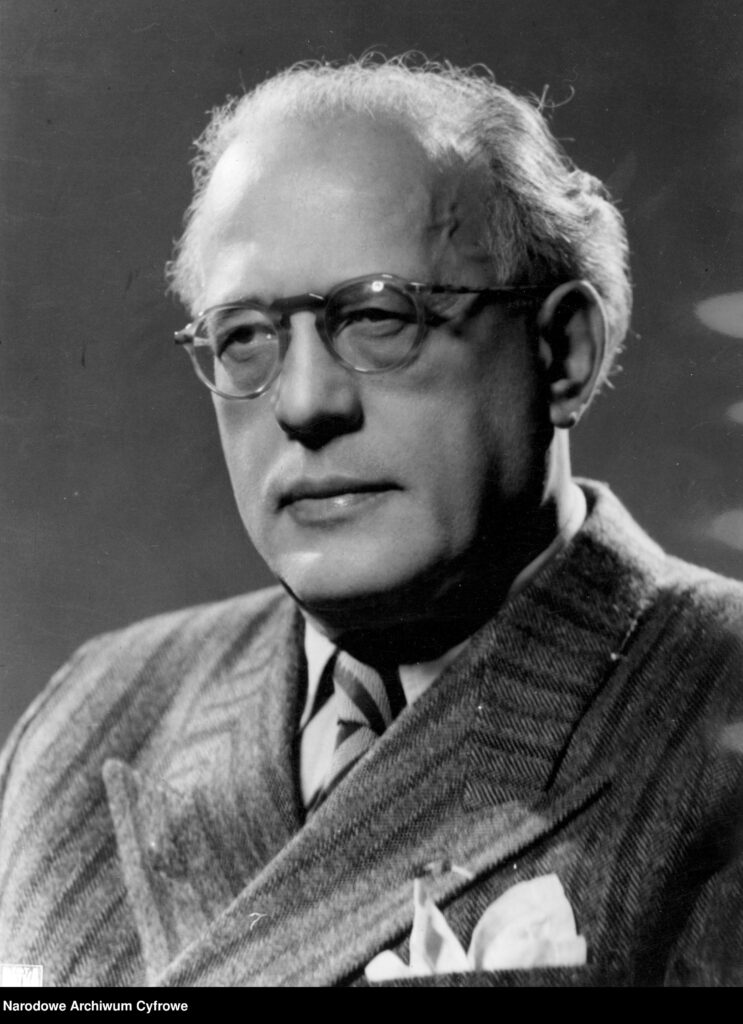Grzegorz Fitelberg (1879 – 1953)
Grzegorz Fitelberg (born on 18 October 1879 in Daugavpils) goes down in the history of Polish music as an excellent violinist, an outstanding composer, and most of all as a brilliant conductor. He had special merits for promoting contemporary music and introducing the latest pieces of music in the repertoire of orchestras in Poland and all over the world. Owing to his mastery of conducting, Fitelberg was often compared to Gustav Mahler, and his persistence and consistency in choosing his repertoire aroused both delight and controversy, keeping him in memory as an incredibly expressive and uncompromising character.
Grzegorz Fitelberg’s talent revealed itself very early. When the artist was only 12 years old, his parents sent him to Warsaw to study in the Institute of Music. At the time, he demonstrated special abilities in several fields, which allowed him to be accepted in the violin class with Stanisław Barcewicz, but also in the class of theory and composition, where he studied under the supervision of Gustaw Roguski, and subsequently Zygmunt Noskowski. After graduation from the Conservatory, having obtained two diplomas (in Violin and Composition), he started work in the orchestra of the Grand Theatre in Warsaw. Then, in 1901 he was appointed a concertmaster of the second violin section in the newly established Warsaw Philharmonic.
His composing pursued at the same time was gradually being appreciated in numerous competitions. In 1898 he won the 1st prize in the I.J. Paderewski Composition Competition in Leipzig for his Sonata in A-minor for violin and piano he had composed at the age of 15, while still at college. Another success was his triumph in a competition held in Warsaw by Count Maurycy Zamojski in 1901. These awards were a driving force for him to write more music, which was appreciated by audiences and critics alike during concerts held in Poland and abroad.
Grzegorz Fitelberg’s debut as a conductor was the premiere of his Symphony No. 1 (1904/1905 season of the Warsaw Philharmonic). And although this performance was reviewed focusing on the composition rather than his conducting skills, it became a spark of Fitelberg’s new love – the conductor’s podium proved to be more attractive to him than the music stand of an orchestra musician.
The path of the conducting baton he entered in Warsaw led him to Berlin, where he met Karol Szymanowski – a composer who was to become one of his closest friends and who entrusted premieres of most of his works to him. It was also in Berlin where the Young Polish Composers’ Publishing Company was established in 1905 (later: Young Poland), created thanks to the support of Prince Władysław Lubomirski by Grzegorz Fitelberg and Ludomir Różycki together with Karol Szymanowski, Apolinary Szeluto, and Mieczysław Karłowicz. And even though Young Poland prevailed only until 1912, the music deriving from this group was featured in programmes prepared by Grzegorz Fitelberg and played with orchestras all over the world on a permanent basis.
When Grzegorz Fitelberg was entrusted the task of creating a programme of a concert or a season, it was sure to be dominated by contemporary music. The latest compositions enjoyed a special place in the life of this artist, who wished to popularise and promote living composers. Hence his repertoire often comprised works by members of Young Poland (including aforementioned numerous compositions by Karol Szymanowski and his own), as well as pieces by Igor Stravinsky, Béla Bartók, and Sergei Rachmaninoff.
In 1906-1953 Grzegorz Fitelberg gave 189 concerts abroad with contemporary Polish music. He conducted premiers of such oeuvres as “Eternal Songs” op. 10 by Mieczysław Karłowicz, Symphony No. 1, Symphonic Variations, or “Silesian Triptych” by Witold Lutosławski, Violin Concerto No. 1 and Concerto for String Orchestra by Grażyna Bacewicz, as well as most compositions by Karol Szymanowski, including “Stabat Mater”, a concert performance of the ballet “Harnasie”, Violin Concerto No. 2, and Symphonies Nos. 1, 5, and 2, dedicated to the conductor. He conducted the premiere of “Mavra” by Igor Stravinsky in Paris, he also toured South America with the ensemble of Compagnie des Opéras Russes.
Grzegorz Fitelberg conducted various bands in Europe and both Americas. He cooperated with distinguished composers and soloists, with such personalities, as Richard Strauss, Aleksandr Glazunov, Artur Rubinstein, Sergei Rachmaninoff, Béla Bartók, Efrem Zimbalist, Paweł Kochański, Eugène Ysaÿe, Irena Eneri, Henryk Melcer-Szczawiński, Vsevolod Boujukli, Wilhelm Backhaus, Pau Casals, Eli Kochański, Mattia Battistini, Adela Comte-Wilgocka, or Maria Calma-Veselá.
His work brought him numerous awards and distinctions. In 1927 he became the Knight of the Order of Polonia Restituta and Corona d’Italia. In 1937 Fitelberg and the Symphony Orchestra of the Polish Radio he conducted were granted Golden Medals at a competition of European orchestras and conductors organised to commemorate the International Exposition in Paris. In 1947 he was honoured with the Commander’s Cross of the Order Polonia Restituta with Star and an award of Polskie Wydawnictwo Muzyczne for conducting contemporary Polish music. Together with the Grand Symphony Orchestra of the Polish Radio he received the National Artistic Award of the 2nd Degree (1950) and of the 1st Degree (1951).
In his career, he held the position of the 1st conductor of the Warsaw Philharmonic, the bandmaster of the Vienna court with the title of Kaiserlicher und Königlicher Hofkapellmeister, as well as the conductor of the Vienna Opera House, the head conductor of the National Symphony Orchestra (Court Orchestra) in Petersburg, the conductor of the Bolshoi Theatre in Moscow, the conductor of Russian Ballets of Sergei Diaghilev, the member of the State Opera Council and the Artistic Council of Music Department operating at the Mariinsky Theatre; he also sat in the management board of the People’s House Opera Theatre. In 1934-1939 he was the artistic director and the 1st conductor of the Polish Radio Symphony Orchestra in Warsaw, which he conducted during the first concert ever of a Polish orchestra broadcast by radio stations abroad. After the reactivation of the ensemble after the war in 1947 under the new name, the Grand Symphony Orchestra of the Polish Radio, and moving its headquarters to Katowice, he was its director and 1st conductor for the rest of his life.
The Grand Symphony Orchestra of the Polish Radio under the baton of Grzegorz Fitelberg played the first concert for a real audience on 23 September 1947 in the concert hall of the Silesian Philharmonic. That occasion marked the beginning of its regular concerts in that venue – twice a month, with one of the concerts broadcast by radio stations in Poland and abroad. The concert hall of the Silesian Philharmonic is the very place where the premiere of the aforementioned Symphony No. 1 by Witold Lutosławski was held on 1 April 1948.
Grzegorz Fitelberg died on 10 June 1953 in Katowice. The last concert under his baton took place on 26 May 1953 in the concert hall of the Silesian Philharmonic, an institution which was bound with the figure of this acclaimed conductor in a special way, since 1953 operating under the supervision of his student, the only one he had ever prepared to the diploma, Karol Stryja. It was him who in 1979, on his maestro’s 100th birthday, organised the first Grzegorz Fitelberg International Competition for Conductors. Nowadays, this event is one of the most important performance competitions in Poland, belonging to the World Federation of International Music Competitions in Geneva since 1982.




